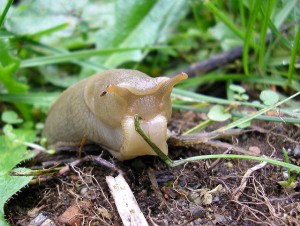Neonicotinoid pesticide use leads to increased crop damage by slugs
A recent study published in the Journal of Applied Ecology found that the use of neonicotinoid pesticides in soybean crops reduced yields by indirectly increasing crop damage by slugs, a tenacious crop pest. Researchers found that exposure to neonicotinoids did not have a negative effect on slugs, likely because neonicotinoids are specialized to affect the insect brain and slugs are mollusks. However, when slugs ate neonicotinoid-treated soybeans, they became toxic to their natural insect predators. In a laboratory experiment, slugs were fed an organic diet or seedlings from neonicotinoid-treated soybean seeds. These slugs were then fed to C. tricolor beetles, natural predators to slugs in the field. Beetles that consumed the ‘organic’ slugs appeared normal, while more than half of the beetles that consumed the ‘neonicotinoid’ slugs exhibited a range of symptoms including twitching, paralysis, and death. Results from field trials mirrored what was observed in the laboratory. The number and diversity of natural slug predators, the number of slugs, slug damage to the soybean plants and crop yields were compared between fields planted with neonicotinoid-treated soybean seeds and fields planted with non-neonicotinoid seeds. In fields planted with neonicotinoid-coated seeds, there were fewer slug predator insects present, and more slugs present, resulting in a 19 percent reduction in soybean seedlings and a 5 percent decrease in soybean yield. The authors conclude that “this indiscriminant use [of neonicotinoids] can have unintended consequences, with measurable costs for farmers.”




